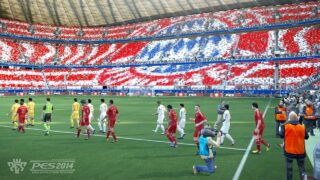
Konami has officially announced Pro Evolution Soccer 2014, the next entry in its hit soccer series, for a 2013 launch across PlayStation 3, Xbox 360, PC, and PSP.
The Tokyo-developed soccer sequel utilizes Kojima Productions‘ Fox Engine at its core, and is built atop six key pillars. Every aspect of the game has been “totally reworked” and rebuilt “from the ground up,” and has a central theme of “fluidity” based on the constant movement and switching of characters. It promises “a central core that perfectly mimics the skill and awareness” of soccer players in place of previous games’ “dated animation systems and AI elements.”
Pro Evolution Soccer 2014 will also mark the first appearance of the recently-signed Asia Champions League, adding a host of new clubs to the competition. The UEFA Champions League club competition will also appear, and other tournaments will be announced at a later date.
New online elements are also promised, but will be detailed in a followup report.
The game is currently 70 percent complete. Its six pillars are detailed below.
True Ball Tech
For the first time in a football simulation, PES 2014 centres everything on the ball: how it moves, and how players use it. First touch and sublime control are what set certain players apart from others. The ability to not only read a pass, but to be one step ahead and to know what is needed to gain yards on an encroaching defender. TrueBall Tech allows the player to trap or knock on a pass using the analogue stick with detailed barycentric physics determining the weight shift of the player and the height and speed of the pass, as to how the player’s body will automatically shape to receive it.
Thus, the player has total control in determining how their body is angled to receive a pass, whereas previous football titles present the user with scant options. Instead, TrueBall Tech means that it can be chested or nodded past an opponent, flicked into space or to a team mate, while closer dribbling control is a much more personal attribute in the new game.
The PES series has long since treated the ball as an individual entity, allowing the player huge amounts of freedom to pass into space, run on to a knocked-on counter, or produced short triangular passes to make space. TrueBall Tech adds even more freedom, with the player’s movements worked around those of the ball and, unlike any other football title, as opposed to the other way round. Players will be able to truly control the free-moving ball, use its pace or alter its movement to master close control in PES 2014.
The result is a game that offers full 360-degree, two-footed control within several yards around the player. In addition to steering the ball with subtle movements, there is the ability to shield the ball from opposing players, use deft controls to wrong-foot them, and intuitive methods to master close control.
Motion Animation Stability System (M.A.S.S.)
The physical combat between players is a vital part of any match, and the new M.A.S.S. component simulates the bodily contact between multiple players within bespoke animations that segue seamlessly into each other. Rather than a series of preset animations that occur under specific circumstances, M.A.S.S. acts instantly to any situation, with the reaction of a fouled player entirely dependent on the direction and force with which they are tackled. Dependent on factors such as their size and power, players will stumble but instantly recover if clipped, barge others off the ball, and use their stature to block players from possession. Similarly, PES 2014 now has more styles of tackle, as opposed to basic foot in or sliding types.
Tackling also becomes more integral to PES 2014’s quest for realism, with clashes of players utilizing the TrueBall physics to ensure the ball reacts as it would in a real game. As players fight for a 50-50 ball, their result challenge will see the ball bobbling into space, or emerging at the feet of the triumphant player.
The integration of the M.A.S.S. element has also facilitated new advances in one-on-one situations. The individual battles between key players can determine the outcome of a match, so particular emphasis has been made on such battles in PES 2014. Defenders will put greater pressure on the attacking player, by tussling for possession, standing back to restrict passing opportunities, or making the tackle. Likewise, attackers are faced with ether trying to outpace the defender while retaining possession, feinting to gain advantage, or passing, dribbling or shooting when space allows. The result allows for incredibly open games, where the attributes and skills of the players come to the fore in personal feuds all over the pitch.
Heart
Defining what makes football so engrossing is difficult. It isn’t a technical thing, but more an emotional hook. Matches can be imposing for visiting teams, as home support barracks the opposition, and acts as the infamous ‘twelfth man’ by cheering their side on. PES 2014’s ‘Heart aims to recreate the effects of team support, both on an individual player basis and across the entire team.
Each player in the game now employs mental attributes in addition to playing styles and skills, and can be adversely affected when having a poor game. However, if an individual is not playing well, his team mates can rally round and will work to support him. Similarly, one moment of individual brilliance can produce a galvanizing effect on team mates. The cauldron effect of a vibrant stadium will showcase the mood of the fans, with all-new sound effects combining with stunning AI systems to create a palpable match day atmosphere.
PES ID
PES 2013 set a new bar for realism, with its inclusion of the Player ID system. For the first time, players could instantly recognize a player by their faithfully recreated running and play styles. The way a player ran, moved and spread the ball about would be identical to that of their real-life counterpart, and PES 2013 featured 50 players that utilized the system.
For PES 2014, that number will be greatly expanded, with twice as many stars featuring bespoke animations and AI.
Team Play
Via the new game’s innovative Combination Play users can set up a variety of different tactics in key areas of the pitch using three or more players. These players will make very different off-the-ball runs to exploit holes in the defense or midfield, using the flanks, curved runs, or overlapping play to make themselves available. These moves can be preset to key areas of the field, allowing users to exploit defensive weaknesses beforehand.
The Core
PES Productions have undertaken several years of consultation with PES and football fans to reproduce key elements of the series and implement a wide range of additional improvements.
Visually, the game will benefit from an incredible level of acuity, from the weave of the kits, through to facial movement, and a new animation process that offers slick segues from one move to the next, with no pauses or restrictions on control. Stadia will be faithful to real-life, with the entrances to the pitches recreated, crowds that move during the course of the game The new system also allows for a new light-mapping effect, adding a natural look to the proceedings. The flow of a match has also been improved, with tactical decisions made on the fly, and the removal of cut scenes after specific events.
Free kicks and penalties have also been radically changed. Control over free kicks has been expanded with decoy runs added and short passes now unrestricted. To counter, players can now move the position of their keeper for the kick, while the wall will react to the kick instinctively to block or deflect the ball.
Penalties now use a target guide that is changed according to the kicker’s ability and where they intend to place the ball. The goal keeper can now opt to move ahead of the kick, sensing when the penalty taker is not particularly strong.
View the first screenshots of PES 2014 at the gallery. The first trailer is expected to debut during Konami’s pre-E3 show on Thursday, June 6. If you missed the teaser, catch it here.
slide 1 of 5
- ❮
- ❯
slide 1 to 5 of 5









